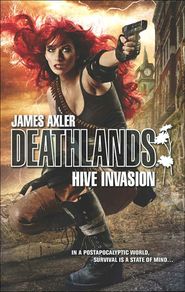По всем вопросам обращайтесь на: info@litportal.ru
(©) 2003-2024.
✖
Labyrinth
Автор
Год написания книги
2019
Настройки чтения
Размер шрифта
Высота строк
Поля
“This has to be it,” Ryan said. “The distance is right. The size is right. And the map only showed one canyon.”
“Mebbe the water didn’t back up this far,” Krysty suggested.
“Or the reservoir has been drawn down considerably since Armageddon,” Doc commented.
“It’s also possible that the dam’s been breached,” Mildred said. “And that either the river’s dried up, or it’s running deep underground.”
Tipping his hat brim to block the glare of the sun, J.B. looked down the gorge, in the direction of the dam. “The water might still be there,” he said. “Below our line of sight in the canyon bottom.”
“Even if the river has dried up,” Mildred added, “low spots in the bed could hold standing pools. The deepest part of a reservoir is usually at the base of its dam. Even if the dam’s broken, there could still be plenty of water trapped in front of it.”
“Our best hope for finding water is the canyon,” Ryan said. “We’ve got to follow it. We’d better get moving. Cover as much ground as we can before the sun gets high.”
There was no discussion about whether to descend to the canyon floor; in fact the subject didn’t even come up. Although walking along the rim was a much longer trek because of the short side canyons they had to skirt, it was also the high ground, and that gave them a tactical advantage. They couldn’t be pinned down and ambushed on the rim.
About a half mile down-canyon, they came to a wide, flat spot that had been cleared of rocks. They would have walked right past it if Mildred hadn’t spoken up. “Hey, wait a minute,” she said. “We’ve got ourselves a field here. A cultivated field.”
Doc stared at the empty patch of dirt bounded by boulders and said, “Not in recent memory, my dear.”
Mildred corrected herself. “The field is a remnant of prehistoric agriculture,” she said. “A thousand years ago the local cliff dwellers grew crops on top of these canyons in plots just like that. There should be a path somewhere around here down to their cave….”
“There,” Jak said, pointing out a shiny, shallow groove worn in the bedrock. It led away, to the apex of the side canyon ahead.
“This is important?” Krysty asked.
“Storage wells,” Mildred told her. “All the ancient settlements had them. The residents hauled water up from the river and stored it in stone cisterns in their caves. They also built catch basins and channels that fed rainwater from the plain down to their wells. These cisterns were always covered and in shade. There could be some water left from the last rain, whenever that was.” She paused, then said, “I know it’s a long shot…”
“Worth a look, anyway,” Ryan said.
The prehistoric path ended at the cliff edge. The companions stared down at a steep, rubble-filled chute. The scree of large rocks had been tossed from above, forming crude steps, which turned around a bend fifty feet below and vanished from sight. Ryan and the others carefully descended, as the loose rocks shifted under their weight. Around the blind corner a sandstone ledge jutted from the canyon wall. They followed the narrow walkway along the face of the overhanging cliff. It was a long, straight drop to the bottom, at least two hundred feet. The ledge led them to a broad, shallow cave with a towering, arched ceiling.
The cliff dweller ruins were barely recognizable as such. From their deteriorated condition, it was obvious that the reservoir had covered them at one time. The sun-dried bricks had melted, the two- and three-story structures had collapsed. Mud-and-stick pueblos weren’t designed to be submerged and then subjected to wave action. When the dammed waters had retreated, they had done so with enough force to wash away the stone foundations of the buildings closest to the ledge.
The covered cistern lay at the back of the cave, where the ceiling sloped down to meet the floor—a wide, circular, five-foot-deep pit, lined with flat, tightly fitted stones. At the bottom of the well, spread across its lowest corner, was about a gallon of liquid.
Brown liquid.
Ryan hopped down into the pit and put a finger in it.
It was thick. Slimy between his fingers. It didn’t smell bad, though.
“We’re going to have to boil the hell out of that stuff before we try to drink it,” Mildred said.
Ryan looked up at J.B. and said, “Better start scrounging up some wood for a fire.”
J.B., Doc and Jak immediately set about kicking apart a surviving, thirteenth century mud-daub wall, this to pull out the mat of dry sticks that reinforced it. Anasazi rebar.
Mildred and Krysty joined Ryan in the bottom of the cistern. The three of them got down on their knees and sopped up the precious moisture with rags, then carefully squeezed it, drop by drop into their battered tin cookpot. Before trying to boil the mess, they filtered it through several layers of clean fabric. This removed the bigger chunks, but it was still brown, still thick.
The water of last resort.
While it bubbled and frothed in the pot, the companions moved to the edge of the ledge and took in the spectacular view.
“The people who lived up here must’ve thought they ruled the world,” Mildred said. “They built. They farmed. They stored for hard times. They prospered. And now there’s nothing left. Not even ghosts. It makes me think of that sad, sad poem…I forget the title.”
“You are referring to ‘Ozymandias’ by Percy Bysshe Shelley, I believe,” Doc said. “Words found inscribed among decaying ruins, buried in drifting sands.”
“‘Science Blows,’” Ryan said, quoting the ubiquitous Deathlands’ craphouse graffito.
“Bravo,” Doc said with a smile. “You have it precisely, dear Ryan. It is nothing less than the paradigm of human existence, forever blinded by our pride, and victims of the inexorable march of time.”
“Over there!” J.B. exclaimed, pointing up at the sky.
They all turned to look.
The buzzards, perhaps thirty of them in all, were mere specs in the distance down-canyon. Circling in a slow spiral at three thousand feet, the carrion birds became visible, one by one, as they turned and were momentarily sidelit by the sun.
“Something’s below them, for sure,” J.B. said to Ryan.
“From the height they’re flying,” the one-eyed man replied, “something not quite dead enough.”
His speculation was punctuated by the crack of a single gunshot, its echo rolling up the canyon.
The flat, unmistakable report of a shotgun.
“That boil is going to have to do,” Ryan said. “Fill up the canteens and kick out the fire. Let’s move!”
After scrambling back to the canyon rim, Ryan led the others at a full-out trot, despite the building heat and the now dead still air. Out of food, and on scant rations of barely potable water, the companions absorbed this new punishment without complaint. The buzzards weren’t a good sign, but at least one person was alive. If they waited until evening to investigate, they might never catch up to whoever had fired the shot. And that could mean the difference between life and a very unpleasant death.
As Ryan ran, he kept his eye on the flock of buzzards, watching them slowly descend from altitude, then spiral down into the canyon, out of sight. He marked the spot ahead where they disappeared. There was no more gunfire. The shooter was either out of ammo, or out of luck.
It took five minutes to close the gap. The canyon beside them had grown much wider, if not deeper. It was impossible to miss the vultures against the beige of the dirt and rock—black feathers, seven-foot wingspans, angry red heads. A mob of them, fighting over the spoils. Ryan flipped up the lens covers on his telescopic sight and scanned the crude campsite. He counted four sets of human legs half-hidden under the flapping wings and snapping beaks. Legs that were kicking, shuddering amid the frenzy.
“All dead?” Mildred asked.
“Let’s find out,” Ryan said. He tucked the Steyr tight to his shoulder and squeezed off a 7.62 mm round.
The bolt gun bucked hard and downrange, a lone buzzard exploded in a puff of blood and dark feathers. As the loose bag of bones tumbled to the ground, the other birds abandoned their feeding positions. Squawking, flapping, they hopped to the safety of nearby rocks.
Ryan surveyed the now-still human forms through the scope, then said, “Yep, they’re all dead.”
“Shooter must’ve taken off,” J.B. said.
“Can’t tell from up here,” Ryan said. He handed the Steyr to his friend. “Jak and me are going to go have a look-see. Watch our backs.”
They found and followed a narrow chimney of rock that led to the canyon floor and the gruesome campsite. Four of the bodies were clustered together; the fifth lay a short distance away.
“Been dead awhile,” Jak remarked of the four.











